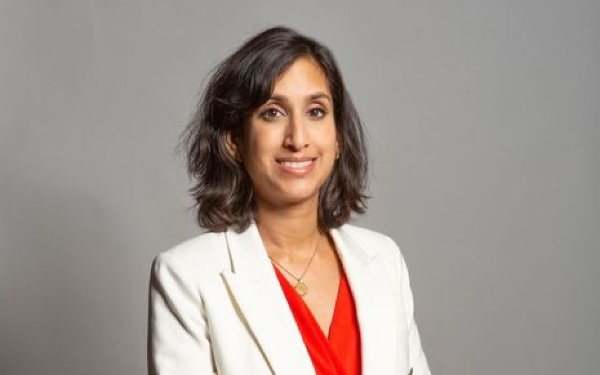
The government has appointed its fourth children’s social care minister of the year ahead of a critical period for the sector.
Claire Coutinho, appointed as a junior minister in the Department for Education last month, has been given responsibility for social care, alongside special educational needs and disability and other issues concerning vulnerable and young children.
Coutinho, in effect, succeeds Kelly Tolhurst, who left her post as minister for schools and childhood in October, just one month after her appointment was announced.
Unlike Tolhurst, Coutinho will not combine her responsibilities for children’s social care and vulnerable children with oversight of schools policy, while her appointment also returns children’s social care to being the responsibility of a junior minister. Tolhurst had held the role at the more senior minister of state level.
Before joining the DfE, Coutinho, an MP since 2019, spent a month as minister for disabled people, and her previous roles have included working for centre-right think-tank the Centre for Social Justice in areas including regeneration policy.
New minister’s praise for social workers
While her brief as minister for children, families and wellbeing was confirmed today, Coutinho signalled that she would be responsible for children’s social care on Friday, when she tweeted her appreciation for social workers ahead of the annual Social Worker of the Year Awards ceremony.
Social workers do an incredible job to help the most vulnerable children and families & tonight the @socialworkaward will recognise some outstanding work. Congrats to all of tonight’s winners in advance & a big thank you to all the amazing social workers across the country #SWA22
— Claire Coutinho MP (@ClaireCoutinho) November 4, 2022
As with incoming education secretary Gillian Keegan – who became the fifth holder of that post in 2022 last month – Coutinho’s appointment comes ahead of a significant period of change for the sector, with four major reports sitting in their in-trays.
Sector faces shake-up and demand pressures
The DfE had committed to responding to three of these – the Independent Review of Children’s Social Care’s final report, the Child Safeguarding Practice Review Panel’s inquiry into the murders of Arthur Labinjo-Hughes and Star Hobson and the Competition and Markets Authority’s study of the children’s social care market – before the end of 2022.
However, it is not clear how far this timetable will hold under new prime minister Rishi Sunak.
Social care reform proposals
- Independent Review of Children’s Social Care (May 2022): this proposed increasing social worker skills and retention by introducing national pay scales, tied to progression through an early career framework and the introduction of expert practitioner status for those who complete the framework, along with increased investment in early help and kinship care, the abolition of the independent reviewing officer role and regional commissioning of care placements to reduce big providers’ hold on the market.
- Child Safeguarding Practice Review Panel inquiry into Arthur Labinjo-Hughes and Star Hobson murders (May 2022) – this called for the creation of multi-agency safeguarding hubs to lead child protection cases, in order to improve inter-agency working and practice skills.
- Competition and Markets Authority study of children’s social care market (March 2022) – this urged the creation of national and regional bodies to help councils find the right placements for children, improve value for money and reduce out-of-area placements, and a shift in provision from independent fostering agencies to council-run services, also to improve value.
- Independent Inquiry into Child Sexual Abuse (October 2022) – this proposed placing a duty on professionals and others in close contact with children to report child sexual abuse, to tackle under-identification of CSA, the creation of Child Protection Authorities for England and Wales to improve practice and advise governments on policy and the professional regulation of children’s home and youth custody staff.
At the same time, the sector is facing mounting demand and financial pressures, as it emerges from the pandemic and deals with the impact of the current high rate of inflation.
Child protection enquiries reached record levels in 2021-22, up 10% on the year before, on the back of a 9% rise in referrals to children’s social care, according to DfE figures, while the Association of Directors of Children’s Services has calculated that councils face a shortfall of almost £800m in their children’s services budgets this year.
This has raised serious concerns about the impact of next week’s autumn statement, when chancellor Jeremy Hunt is expected to announce £35bn in annual public spendng cuts. These are expected to kick in after the current government spending review period ends in 2025. However, in the meantime, councils will still have to manage with budgets that are lower in real-terms than anticipated at the time of the spending review, in 2021, because of the much higher rate of inflation.


 Assistive technology and dementia: practice tips
Assistive technology and dementia: practice tips  A trauma-informed approach to social work: practice tips
A trauma-informed approach to social work: practice tips 




 Find out how to develop your emotional resilience with our free downloadable guide
Find out how to develop your emotional resilience with our free downloadable guide  Develop your social work career with Community Care’s Careers and Training Guide
Develop your social work career with Community Care’s Careers and Training Guide  ‘Dear Sajid Javid: please end the inappropriate detention of autistic people and those with learning disabilities’
‘Dear Sajid Javid: please end the inappropriate detention of autistic people and those with learning disabilities’ Ofsted calls for power to scrutinise children’s home groups
Ofsted calls for power to scrutinise children’s home groups Seven in eight commissioners paying below ‘minimum rate for home care’
Seven in eight commissioners paying below ‘minimum rate for home care’
 Facebook
Facebook X
X LinkedIn
LinkedIn Instagram
Instagram
‘the independent review’ – just remind me who employs the author now and how much government money did his organisation get beforehand? Interesting use of the word ‘independent’.